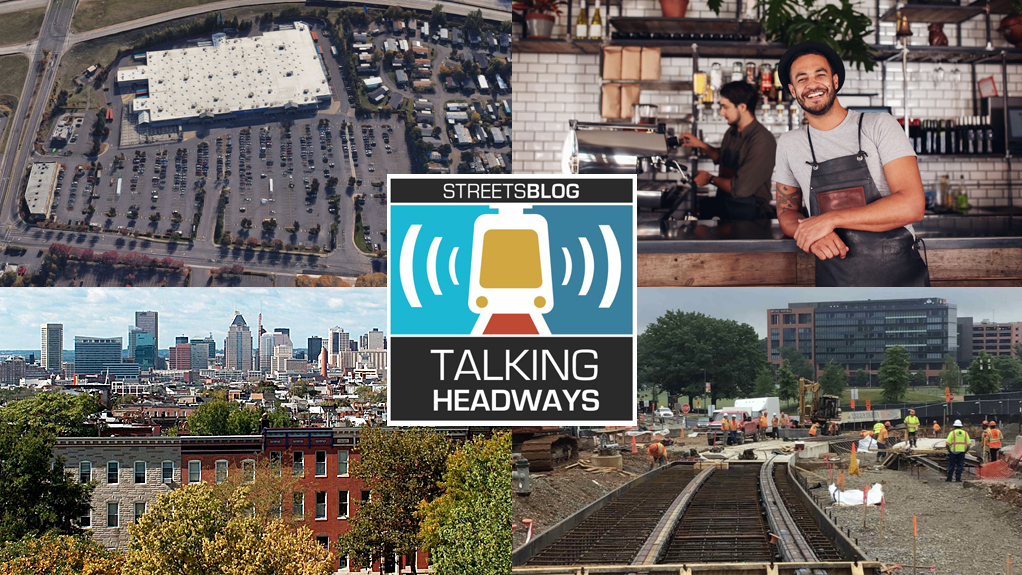This week, we’re joined by Dr. Kathryn Howell, director of the National Center for Smart Growth at the University of Maryland, to talk about her daily e-bike commute, organizing around the Purple Line, the importance of eviction data, and commercial displacement.
Many of you like to read rather than hear, so click here for the full unedited transcript. And if you want to get a taste, check out the edited transcript below the player.
Jeff Wood: Why is it important for the coalition to focus on affordable housing and small business retention. I don’t know if that’s something that gets targeted when we’re building these kind of large transit projects.
Dr. Kathryn Howell: We often don’t. Increasingly there’s a real focus on what’s called what’s e-TOD or Equitable Transit Oriented Development. That’s increasingly a conversation that’s happening within the transit field, and it’s really focused on thinking about not just the outcomes. Yes, it’s affordable housing because it’s not very smart, it’s not actually transit oriented, if you displaced somebody to somewhere where they can’t take transit anymore. We have to focus on the anti-displacement element as we are growing, right? We know these impacts. We’ve got decades of research saying that this is an impact of some of the investments that we’ve been making in our transit areas.
And businesses are the same, right? Rents go up for businesses as much as they go up for housing. We do demolitions of old shopping centers, say, in the suburban areas. We have all these old shopping centers that came up in the 1970s and '80s that were very car-centric. So huge parking lots, big anchors, that don’t really match what’s going on with a transit mode. We know that transit stops are most successful where there is density.
And so the combination of those things mean you have to be really attentive to who lives there when you get started. And who’s working there and who’s owning businesses there. When you do a demolition and build a new building, it’s really hard to keep those spaces affordable for existing businesses. It’s hard to keep it affordable for a a mom and pop running a restaurant.
We have just an amazing whole world happening along the Purple Line corridor and it’s a really beautiful thing, but it’s also getting more expensive. The rents are rising for folks who are running businesses or people who are renting or owning homes on the corridor.
So, you know, whether it’s a post-war apartment building, maybe it’s not in great shape, but someone’s going to buy — the land itself is actually often more valuable than keeping the building. And so those buildings are full of immigrant families who are moving here, single adults who are working, often in the area, taking transit, working construction. They’re owning businesses and they ultimately need to be able to have affordable housing. And that’s something that it’s tough to do without really being intentional about it because there is a lot of land value there.
Jeff Wood: We talk about displacement and obviously the discussion about e-TOD has taken off over the last several years, but I just saw research yesterday from the University of Minnesota talking about kind of displacement that happens during road construction and that could include transit, but it actually impacts areas that are more urban, that are more suburban.
I find that really fascinating because these are kind of businesses that have come up in these areas that have been low cost in the past, but then as soon as you make an improvement, they have trouble kind of keeping up with the increases in prices and increases in values and things like that. And so, one suggestion was that maybe we should delay some of the funding that we give them during construction till after, until they can kind of settle in.
Dr. Kathryn Howell: Yeah, we often don’t talk about businesses and it’s interesting because businesses are often what people talk about when asked why they love their communities. There are things that make your neighborhood feel like home. And actually one of the other programs at the center of the small business anti-displacement network is really thinking about this on a national level. They’re asking if we can go beyond technical assistance, right?
One mom said to me, “We’ve been 'technical assistanced' to death!” We’ve, we’ve all done it, we’ve all tried, but at the end of the day, right, the rent’s going up and right now there’s just construction that’s incredibly disruptive for these businesses and it’s not evenly spread. So, yes, we've been talking with our local jurisdictions about that — giving out all of that construction money at the same time to the same level is not really helpful because there’s some businesses where it’s really hard to get in the front door and there’s some businesses, it’s just kind of hard to drive down the street.
I think one of the things that the Small Business Anti Displacement Network is thinking about is collective ownership of buildings like cooperatives in housing. Is there a way to kind of take the land out of speculative cost increases and make it so the cost can be more predictable over time. We must do some creative work around businesses because we aren’t thinking about it for some reason. Businesses tend to exist in this kind of ether. "Well, that’s the change, that’s how it goes."
And I think, I think probably a lot of it has to do with the way that economic development. And I think it’s a changing perspective, especially as we watch these communities change.






